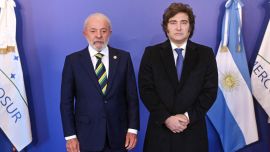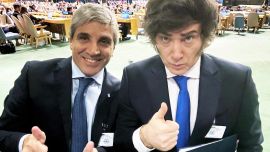Nicolás Dujovne, former economy minister under ex-president Mauricio Macri when the 2018 agreement with the International Monetary Fund was signed, came out to defend the loan in the wake of the multilateral lender’s latest report.
The IMF concluded in an assessment on Wednesday that its record US$57-billion credit-line to the country "did not meet the objectives of restoring confidence."
The staff report released Wednesday, known as “ex-post evaluation” and led by IMF deputy director Odd Per Brekk, is a key step in IMF procedures, which require a staff review of a programme with exceptional access.
Dujovne, 54, challenged assertions by President Alberto Fernández's government and accused it of lacking credibility. He went on to declare that the economy is on the verge of a new exchange rate crisis.
"The IMF today published its assessment of the Stand-By programme signed with Argentina in 2018. I leave here some notes on the Fund's document and on the response formulated by the government and [Economy] Minister [Martín] Guzmán," Dujovne said in a Twitter thread.
For the former minister, during the granting of the loan, the largest in the IMF’s history, “took place in an exceptional situation due to the [agricultural] drought, the rise in [interest] rates in the US and the high deficit inherited. It had the support of all IMF member countries. It was a global political support for a process of change that had begun in the country."
He continued: “It is striking that the current government now takes the IMF's vision of the 2018 programme as its own, but has not been able to reach a basic consensus to sign a [new financing] programme in more than two years of administration," he questioned.
Challenging Guzmán’s contributions to the report, Dujovne said that “the Kirchnerite government wrongly concludes that the problems of the Argentine economy can be solved by defaulted debts and imposing cepos [foreign exchange controls] and [currency] controls. But these have proven to be lousy instruments time and time again," he added, omitting that Argentina entered into default and re-introduced cepos in 2019 under the Macri administration.
"The [current] government restructured the debt, but we still have no-one to lend to us. Moreover, the market believes that it is highly likely that Argentina will default again, which is reflected in a country risk [rate] of 1,700 points," he said.
In Dujovne's view, "the cepo did not serve to rebuild reserves. In the last two years there was almost USD30 billion in trade surplus, but the BCRA [Central Bank] did not stop losing dollars and today, with only USD 3 billion in net reserves, it is on the verge of an exchange rate crisis."
– TIMES/NA/BLOOMBERG





















Comments